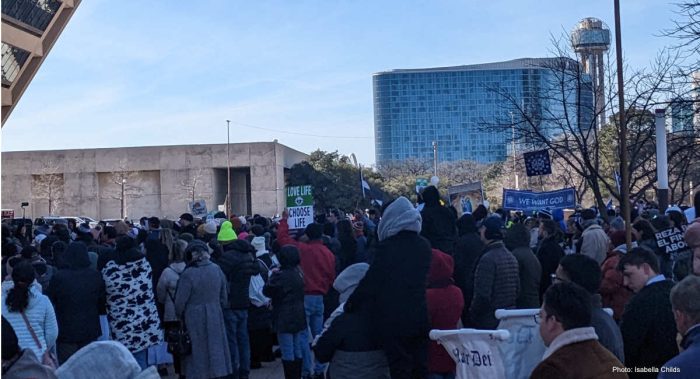I recently attended the North Texas March for Life in my hometown of Dallas, Texas. Over 4,000 people attended the march, which began at the Cathedral Shrine of Our Lady of Guadalupe and wound through the downtown, culminating in a rally in front of the city hall.
“But wait,” you might say, “Isn’t abortion illegal in Texas? Why do you bother to have a march if abortion is illegal in your state?”
While it’s true that abortion is largely illegal in Texas, there are still many reasons why supporting life publicly in Texas is important, even necessary.
1. Texas women are still experiencing unexpected pregnancies.
Something that will never change is the fact that many women, no matter their relationship statuses, find themselves unexpectedly pregnant. And tragically, the Guttmacher Institute estimates that 42% of unintended pregnancies in the United States end in abortion.
Texas has a strong fertility rate and births in the state have increased since SB8, Texas’ Heartbeat Law, was passed in 2021. A study from the University of Houston, published in January of this year, found that the fertility rate in Texas increased by 2% over the course of 2022. Dr. Michael New noted in a recent article regarding the fertility increase that “media outlets reported that the Texas teen fertility rate increased in 2022. While it did, the same outlets have neglected to note that this report shows a 35.7 percent decline in the Texas teen-fertility rate since 2016.”
It seems that more Texas women are carrying their pregnancies to term than in the past – even some that were considered unexpected.
Texas women, like women everywhere, may experience unexpected pregnancies and sometimes need assistance from pregnancy resource centers. Birth Choice Dallas, a pregnancy resource center, shared data with Live Action News confirming that the number of clients they saw increased from 2021 to 2022. In 2021, the total number of clients served by the facility was 978; in 2022, the total number of unique clients served was 1,381 – a 41% increase.
It is crucial for women in Texas to understand that there are many people supporting life and there are many resources readily available if they find themselves unexpectedly pregnant.
Marching for life in a “pro-life state” like Texas, demonstrates that there are citizens who support women in their motherhood, and mothers are not alone in desiring life for their preborn children. Many women and families need encouragement in this area, as well as financial and material resources.

North Texas March for Life (Dallas, 1/20/24) – Photo by Isabella Childs
2. Texas women are still leaving the state to kill their children where abortion is legal.
The number of women in the U.S. traveling to a state besides their own to kill their preborn children has doubled since 2020, claims a recent Guttmacher study. Preborn children are largely protected from abortion in Texas and in Oklahoma, while neighboring states like Kansas and New Mexico have few to no protections for preborn human beings, allowing non-residents to obtain abortions there.
A new abortion business has opened in Kansas since the state’s Supreme Court found a ‘right’ to abortion in its constitution in 2019, bringing the number of abortion facilities in Kansas up to five. According to the Lozier Institute and the Kansas Department of Health and Environment, “there were 12,318 abortions reported in Kansas in 2022, a steep increase of 57% driven by an influx of women from other states.” The majority of abortions in Kansas were performed on “nonresident women or women from other countries” – 69%. The two abortion facilities in Wichita, Kansas, are just 300 miles from the Oklahoma-Texas border – a relatively easy drive.
Abortion travel is a crisis that should be addressed. A march for life in a “pro-life state” can spread awareness of the crisis of abortion travel, and show that the state does not want its women and children in the hands of dangerous abortion providers far from home.
3. Texas women are still using the abortion pill.
Chemical abortion is illegal in Texas, though the law is difficult to enforce due to the private nature of the crime and the availability of the deadly pills through the internet and black market.
Cohorts of abortion pill businesses are posing as “health care” options and reaching out to desperate women via the internet. Use of the abortion pill regimen has been on the rise in the last 20 years, with a steep increase in chemical abortions occurring between 2017 and 2022. According to the Guttmacher Institute, in 2022, chemical abortions accounted for 54% of all abortions.
Administrator of Mother and Unborn Baby Care, James Pelletier, described the abortion pill landscape in Texas during his speech at the North Texas March For Life. “There are 15 states that have passed shield laws… to allow their doctors to prescribe, package, and mail chemical abortions… The fight is not over.”
It is likely that these drugs are also making their way into Texas.
Birth Choice Dallas director Aaron Fowler told Live Action News in an email that “hundreds of thousands of women in Texas of childbearing years who have had abortion would need to stop sexual behavior and that is not something legislation is going to do. The abortion pill therefore is the high demand option that costs a fraction of what the surgery did before.” He added that online abortion pill dispensaries “are working hard to get abortion in [women’s] hands even in abortion free states.”
Marching for life in a pro-life state means taking a public stand against all abortion, including the hidden crime of chemical abortion that is still committed in the state.

North Texas March for Life (Dallas, 1/20/24) – Photo by Isabella Childs
4. Planned Parenthood is still referring for out-of-state abortions.
Planned Parenthood facilities that used to commit abortions, but are now prohibited by state law from doing so, continue to bring money into the corporation and kill babies by referring abortion seekers to other “clinics” outside pro-life state lines.
Sidewalk counseling outside the facilities that refer women for abortions shows the industry that citizens of the state are opposed to their behavior, and shows abortion-minded women that there are people who want to give them and their preborn children free, life-saving resources.
5. People will continue to present legal challenges to pro-life laws.
Roe v. Wade and the devastating half-century of almost unlimited abortion came about by a small legal case brought forward in the state of Texas. People today continue to sue Texas and other pro-life states for laws protecting unborn children, claiming that pro-life laws are contrary to their constitutional freedoms or health care rights.
“Women will die” is a common slogan used to promote support for abortion, and the idea motivates lawsuits, such as the recent case with Kate Cox in Texas. More recently, two attorneys have asked the Texas Medical Board to issue guidance regarding when it is legal to intentionally kill preborn babies.
It is time for citizens in “pro-life states” to rise up and rally in support of their pro-life laws and the pro-life legislators who have worked tirelessly to secure the right to life for all citizens, including the preborn. It is not enough for pro-life laws to pass – the laws must be supported and sustained on all levels of society and culture.
6. It is imperative that everyone in society, especially the young, experience a culture of life.
Laws won’t change until hearts and minds change on the life issue. This means that life must be celebrated in our wider society and culture, influencing families, and from there, influencing politics and civic life.
Peaceful marches, filled with energetic and joyful crowds – with families – are powerful forces for good. They also demonstrate that the cause of life is a public concern, that preborn citizens’ lives are at risk, that a single abortion is not just a private problem of a mother but a societal problem.
The new generations must be educated about life and the evil of abortion, but most of all they must love life – beginning with their own lives. It takes a culture of love to instill this love in the youth.
Marching for life in Texas and other pro-life states is necessary – just as important as before the overturning of Roe.
There is still work to do, even in Texas. Yet ours is a time of hope, a time for a new beginning within the pro-life movement. As Lila Rose said, the pro-life movement has the winning strategy – family. “Family is our future…Human Life is the future…Pro-Life is the Future.”







